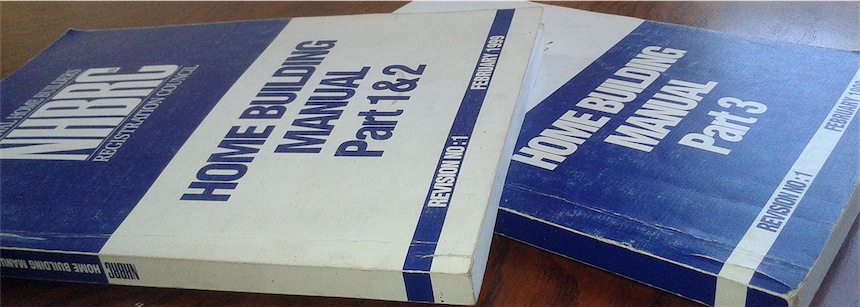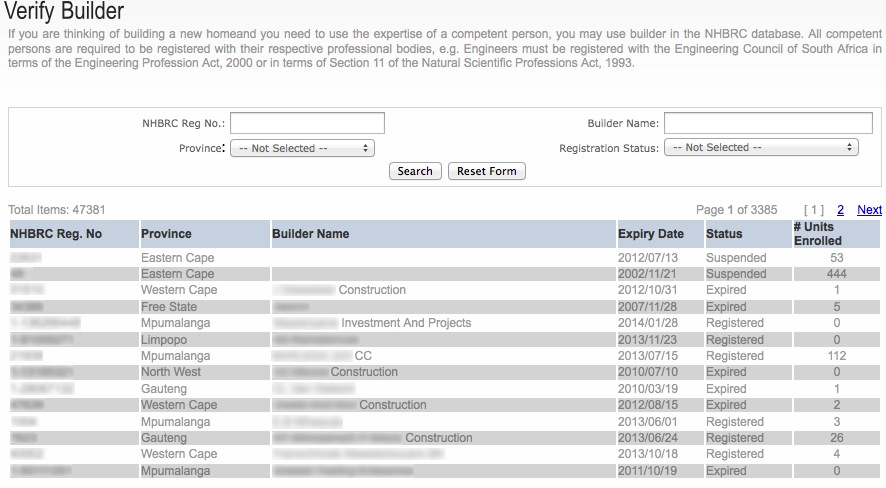About the NHBRC

The National Home Builders Registration Council (NHBRC) was established in 1998 as a regulatory body for the home building industry.
Their mandate is to protect house-building consumers and to make sure that building industry standards and regulations are followed. Their stated aim is to protect housing consumers who use contractors who deliver housing units of substandard design, do bad work and/or use poor quality building materials. There is no limit set on the value or size house that falls under the NHBRC’s mandate to protect.
Legally the term “housing consumers” refers to any person who undertakes to be an owner-builder or “home builder” and/or contracts a construction company or competent person to build their house.
The NHBRC was first established in 1998, in accordance with the provisions of The Housing Consumers Protection Measures Act (Act No. 95 of 1998). You can download the Act here >>Click<<. An amendment and addition was made to the Act in 2007 (available >>here<<), implemented a grading system for home builders, and aiming to address the following issues:
1 An improved response to consumers’ complaints
2 To improve and speed up the enrollment and registration of houses with the NHBRC
3 Ensure that the NHBRC Technical Requirements are adhered to
4 Maintain a high quality of homes being built
In terms of The Housing Consumers Protection Measurers Act, any person in the business of building homes is required by law to register with the NHBRC. With this in mind, the NHBRC urges property owners to make sure that the builders they use are registered and certified by the NHBRC.
All builders are certified by the NHBRC who make sure that they meet regulated industry criteria for technical, construction and financial capabilities.
The NHBRC also states that if you enroll your building project with them (even if you are owner building and not using a registered builder) that they will ensure that you are protected against bad workmanship and poor building practices. They have quality building inspections to ensure that your home is not exposed to structural failure.
Note that all registered builders are bound to enroll ALL their building projects.
If you want to owner build, you need to apply to the NHBRC for an exemption. This means you don’t have to enrol your house, but you won’t be covered by their warranty scheme, and you won’t be allowed to sell your property for at least five years. If you don’t get an exemption and go ahead and build, the NHBRC can fine you … even though you have approved plans from you local authority.
The Council has a builders database and this can be searched to see if a builder is registered and the results will show where they are located as well as their status, see the screenshot below. NB In this sample we have obscured the registration number and names deliberately.

Registered home builders also have specific obligations according to the Council; and these are listed below:
• It is vital for all home builders in the business of home construction to register with the NHBRC and to renew this membership annually.
• It is essential for all home builders to enter into written agreements with clients before construction commences.
• Enrolment of all homes must be done at least 15 days prior to construction beginning.
• All homes must be constructed in accordance with the NHBRC’s technical requirements and the terms, plans and specifications of the written agreement. (Although they do not state this, all homes must also be constructed in accordance with the National Building Regulations.)
• Non-compliance in terms of plans and specifications or any deficiency related to design, workmanship or materials as notified by the housing consumer must be rectified within a period of three months from date of occupation
• Roof leaks attributable to workmanship, design or materials as notified by the housing consumer, that occurs within a period of 12 months from date of occupation, must be rectified.
• Major structural defects as notified by the housing consumer, that manifests within a period of five years from date of occupation, must be rectified.
The NHBRC have a number of forms that have to be filled in from time to time.
Here is a list with a link that will help you to download the necessary forms > Click on the links below<:
Application for Registration AR003
Owner Builder Exemption Form
Residential Unit Enrolment Form EF003
Sectional Title Enrolment Form ST003
Appointment of a Competent Person
Competent Persons Questionnaire
Technical Information Form
Completion Certificate by a Competent Person
Contractor Payment Authorisation PA003
Complaint Form
Renewal Update
NHBRC Services (Commodity) List
Supplier Application Form
Standard Bidding Document SBD9
A few technical documents are available here:
Design and Construction of Houses GFSH-11 2003
NHBRC Warranty Scheme Enrolments and Requirements
Engineering Services
NHBRC Access to Information Manual
The NHBRC website can be accessed here: http://www.nhbrc.org.za/
>
>
 SANS10400-Building Regulations South Africa SANS10400 are the Building regulations in South Africa, and both international and national standards, are fundamental to successful building and construction projects, both big and small.
SANS10400-Building Regulations South Africa SANS10400 are the Building regulations in South Africa, and both international and national standards, are fundamental to successful building and construction projects, both big and small.

Subject:
Need to Register
Message:
Please assist with registration to become a member of the NHBRC
Hi Max,
If you want to register with the NHBRC then you must contact them. You can find the link to their website at the bottom of this page here: http://www.ownerbuilding.co.za/nhbrc-2/
Subject:
insurance amount
Message:
I just want to find out how much money I have to pay for the insurance
to register with NHBCR when the contractor is building a house for me.
Subject:
where do I register
Message:
Cant seem to find where I regisister, please assist
Hi Geraldine, we do not do registrations, I think you need to contact the NHBRC. The Tollfree Number: 0800 146 873 and website is http://www.nhbrc.org.za
Hi Fred, We have an article on our other website that gives all the details of the NHBRC fees that have to be paid here: nhbrc-fees
Good day,
Send through a copy of builder and client standard agreement form.
Regards,
Marks.
Download here. Scroll down to Model Agreement-NHBRC
I just want to check that do you do Enrolment on a back room.thank you
Hi Malusi, We do not do enrolments. The NHBRC does not require you to enrol for additions.
Hi
Do you allow somebody with no building experience to write your exams. the intention is to become a contractor.
regards
Khathu
Please contact the NHBRC directly.
I purchased a home in april 2014 that was built in 2012. The buildings roof is collapsing due to under or no design. How do I find out who the builder was or bring this matter to the attention of your council?
hi
please advise how to complete nhbrc ef003 & b1 forms correctly. an explanation/translation/key so as to understand abbreviated options on said forms
Regards, dee
Deirdre if you have problems with NHBRC forms it would be best to contact them for clarification.
We are not the NHBRC – you need to contact them directly. However you should be able to get details of builder etc from your local council as they hold the approved plans.
Great site – full of common sense / useful information. However I cant track down where the overall maximum height of a residential building is noted.
I have tracked down the recommended FFL to u/s Ceiling which makes sense at 2.40m however floor thicknesses (slabs, etc) as well as use of flat roofs (with a parapet) – no where to be found on this site….
Help!!!
What happens when one buys a existing house five years old which was not registered with the NHBRC,
On purchasing the property I require a bond and the bank is asking for the NHBRC registration certificate. What does one do now?
You have a problem.
Maximum heights can be found in the local authority zoning documents.
Slabs and foundations go hand-in-hand and will be specified on plans.
Flat concrete roofs (with parapet walls) are mentioned in Part L but this doesn’t cover structural design.
Please remember that we have not replicated the building regulations but have rather provided guidelines to them in a fairly simple way that most non-professionals (as in construction) will understand.